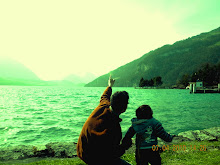 This weekend, while watching a brilliantly crafted 4-hour documentary on the Medici family and their influence on the Renaissance, I felt as if a dream is unfolding before my eyes; a brick-by-brick recreation of some of the greatest artistic achievements of the human mind. Listing names would be futile; like trying to put a galaxy of stars inside a fruit basket. In that dazzling confluence of some of the most revered names in human history, I came across the name of Donatello.
This weekend, while watching a brilliantly crafted 4-hour documentary on the Medici family and their influence on the Renaissance, I felt as if a dream is unfolding before my eyes; a brick-by-brick recreation of some of the greatest artistic achievements of the human mind. Listing names would be futile; like trying to put a galaxy of stars inside a fruit basket. In that dazzling confluence of some of the most revered names in human history, I came across the name of Donatello.Donatello (1386 – 1866) was one of the greatest sculptors of all time and one of the earliest pioneers of the great new artistic movement then sweeping through Florence, which later became the ‘Renaissance’. Rejected by many, in his life he was as much a non-conformist as one could get. He himself not only rejected most of the conventional art existent during his time (at the expense of facing public ridicule), but also developed a great notoriety for sometimes smashing his creations to pieces rather than handing them over to ‘unworthy patrons’ who would not understand.
His artistic conviction, however, was not limited to venting of angst. He also created some of the most path-breaking sculptures (like the bronze David, the first known free-standing nude since ancient period) of his time, breaking all existing conventions and fuelling great public debates, often facing mass hatred. He however, stood his ground. Alongwith Brunelleschi, he was instrumental in forever changing the face of Florentine and European art and architecture.
In our present age, where the concept of ‘selling’ and ‘getting acceptance’ lies at the source of every activity (including art), life and times of people like Donatello needs revisiting. It is artistic conviction like his (and not mere striving for popular acceptance) which lies at the source of all great creations and creative milieus of our history.






